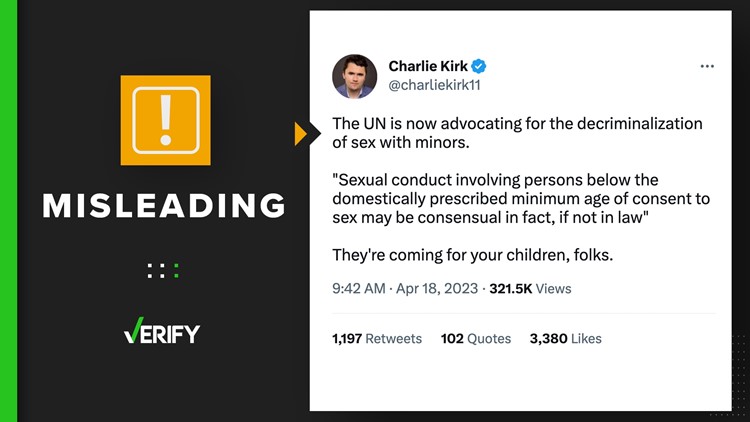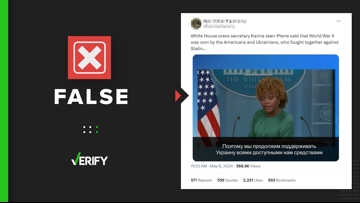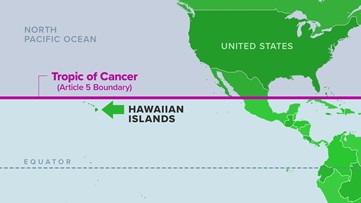On April 18, a tweet from Turning Point USA contributor Charlie Kirk claimed the United Nations, an international organization made up of 193 member states, is now advocating for the decriminalization of sex between adults and minors.
“They're coming for your children, folks,” Kirk wrote.
His tweet came just three days after a tweet from conservative commentator Ian Miles Cheong on the same topic went viral.
Several VERIFY viewers, including Matt, asked if these claims were true.
THE QUESTION
Did the UN advocate for the decriminalization of sex with minors?
THE SOURCES
THE ANSWER
The UN didn’t advocate for the decriminalization of sex with minors, as the viral claims suggest. The report being cited focuses broadly on improving human rights and actually says there are factors that should be considered before someone is charged with a crime for having consensual sex with someone under the age of 18.
WHAT WE FOUND
The viral claims stem from a March report published by the International Commission of Jurists, (ICJ), a non-governmental organization (NGO) composed of 60 judges and lawyers from all over the world. The ICJ isn’t formally affiliated with the United Nations (UN), but they do work with the UN at the international level to address human rights issues. The section of the report cited in the viral claims is missing context.
The report’s larger purpose is to address human rights issues and offers guidance on how those rights should be considered under the law. Nowhere in the report does it say the panel recommends decriminalizing sex with minors.
The recent viral claims center on a section in the report on consensual sexual conduct, specifically. That section, found on page 22 of the 26-page report, is three paragraphs long and doesn’t provide any guidance on if a minor can consent to sex, but whether somebody should be punished for it.
The section led with legal guidance that said people anywhere should not be discriminated against based on their sexual orientation or who they choose to have consensual sex with.
“Consensual sexual conduct, irrespective of the type of sexual activity, the sex/gender, sexual orientation, gender identity or gender expression of the people involved or their marital status, may not be criminalized in any circumstances. Consensual same-sex, as well as consensual different-sex sexual relations, or consensual sexual relations with or between trans, non-binary and other genderdiverse people, or outside marriage – whether pre-marital or extramarital – may, therefore, never be criminalized,” the report said.
Then, the report addresses the topic of age and consent.
The ICJ report says sometimes sex involving persons under the age of 18 might be consensual, even if it’s against the law. The report then said there are certain factors that should be taken into consideration when determining whether someone should face criminal penalties for having consensual sex with someone under the age of 18.
For example, one factor that should be taken into consideration is if a person under the age of 18 has the capacity and maturity to make their own decisions about engaging in consensual conduct.
“Persons under the age of 18 should participate in decisions affecting them,” the report said, with “due regard to their age, maturity and best interests, with specific attention to non-discrimination guarantees.”
While vague, the report didn’t say people under the age of 18 should be having sex with adults, or that the panel recommends decriminalizing sex with minors.
In the U.S., laws on age of consent vary by state. Countries around the world also have their own laws when it comes to age of consent.
The ICJ report didn’t specify which countries it was talking about when it issued these principles, but rather the panel was addressing the international community as a whole.
The ICJ panel was brought together in 2018 by the Joint UN Programme on HIV/AIDS (UNAIDS) and the UN Office of the High Commissioner for Human Rights to create a new set of principles and legal guidance on how the international community should respond under criminal law on topics related to human rights issues.
For example, the report offers guidance on how cases involving abortion, drug use and possession, HIV exposure and some instances of consensual sex could be handled criminally. It doesn’t tell countries to change their laws, but does introduce some factors that can be considered before charging someone with a crime.
VERIFY reached out to the UN and ICJ for comment but did not hear back at the time of publication.













